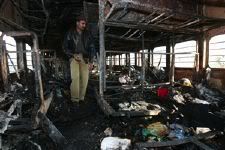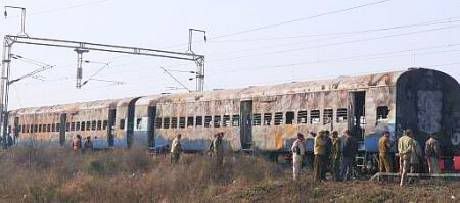Adil Najam
In a tragic development – and what is clearly the most serious threat to recent headways in the India-Pakistan peace process – a train bound from India to Pakistan (Samjhota Express) caught fire, reportedly because of two crude home-made bombs which exploded. Over 60 people are reported dead, most of them Pakistanis returning home, but the death toll also includes many Indians, including some Indian officials.


Here are some details, according to the BBC:
At least 64 people have been killed in a series of explosions and a fire on a Pakistan-bound train in the northern Indian state of Haryana, officials say. Passengers reported hearing two blasts as the train passed near Panipat, about 80km (50 miles) north of Delhi. The train – the Samjhauta Express – was part of a service taking passengers from Delhi to Lahore in Pakistan. A spokesman for Indian Prime Minister Manmohan Singh said the explosions were probably an “act of terror”. A number of other passengers were injured, and officials say the death toll may rise. The Samjhauta Express is one of two train services connecting India and Pakistan. After a two-year gap, it was reopened in 2004 as part of the peace process between the two countries.
Bloomberg adds the following information:
The blasts, which occurred after 11 p.m. last evening, were caused by crude explosives and struck two coaches of the train, India’s Railways Minister Lalu Prasad told reporters today in a televised interview in New Delhi. Pakistan condemned the blasts, saying India must conduct a thorough investigation into the act of terrorism. The train service between Indian and Pakistan is used by people who can’t afford air travel between the nuclear-armed neighbors that fought three wars since independence from British rule in 1947 and started talks to improve relations in 2003. The divided Himalayan territory of Kashmir is at the center of a dispute between the two countries that claim the region in full….
“Preliminary investigations show most of the victims are Pakistanis,” Pakistan’s foreign ministry spokeswoman Tasnim Aslam said in a phone interview from capital Islamabad today. “We expect India to conduct a thorough inquiry to find out the reasons behind this act.” The Pakistan High Commission in the Indian capital is being informed about possible casualties, zonal railways official B.N. Mathur said. A railway guard manning a signal cabin on the route between Delhi and Attari heard two explosions when the train crossed the station near Panipat, a refinery town, Mathur told reporters from the blast site….
India had the responsibility of providing security to the train in its part of the country, Aslam said, refusing to comment on the impact of the blasts on peace talks between the two countries. “We don’t know the motive behind the blasts.”

Pakistan has recently seen a spate of bombings in its major cities, and even before this some in government were pointing towards a ‘foreign hand’ in these bombings. Both countries have long played this game of ‘blame the foreign hand’, including in the recent tragic train bombings in Mumbai. The impulse to do so at the first sign of trouble is a natural one in the sub-continent. Given the deep distrust that exists between the two, it may even be understandable. But irrespective of the short-term political gains such finger-pointing might gain, it is not a very useful way to deal with deep tensions. One certainly hopes that this will not slide to that level and if, indeed, the purpose of those who did this terrible act was to hurt the peace process, then both countries will work together to make sure that this does not happen.
It is a good sign that Pakistan has announced that the visit by the Pakistan Foreign Minister to India will not be canceled. The signals from the Pakistan Foreign Ministry are sober but reasonable. According to The News:
Pakistan Foreign Minister Khurshid Kasuri Monday condemned a train blast in India which killed at least 66 people as a “horrendous act of terrorism” and said most of the victims were Pakistanis. Kasuri said he had asked the Indian government to investigate the incident overnight on a Samjhota Express. “It is a horrendous act of terrorism,” Kasuri told reporters during a function at the foreign office. “I would like the Indian government to investigate this incident. We are waiting for the results of the investigation,” he said. The minister said he had instructed the Pakistani High Commission in New Delhi to send staff to the site to help Pakistan nationals caught up in the blast.
The main leaders in India, including the Prime Minister and President, have also sent the right signals, including condolences to those who have died. The overtures from both sides are to focus on finding the terrorists who committed this atrocity. One hopes that their attentions will remain focussed on this purpose rather than succumbing to the impulse of scoring political points through the unwarranted politics of incrimination. Most of all, one hopes that neither country will allow the peace process to be derailed by this blast.




















































Sridhar, I think you excluded a significant portion of sindhi hindu population from pakistan that visits India often. Although they may not use samjhota for their journey as they are relatively economically better off than urdu speaking travellers from karachi/hyderabad. With high literacy rate, most of them are agricultural land lords, small businessmen and professionals (in medicine to be specific) who have done very well for themselves over the years. In fact some say, just like the memon and chunioti communities of karachi, business comes natural to sindhi hindu communities of sindh. Although they have mostly limited themselves to retail and some wholesale business.
[quote post=”579″]Why Pakistanis want to visit India.[/quote]
In case you don’t know but Pakistan was once a part of India and lot of families are divided between two countries ;).
Pervaiz:
Most of the people in the train (apart from some security personnel) were people visiting their relatives on the other side of the border. Due to various reasons, including but not limited to the number of visas issued by the two countries, there are more Pakistanis coming to India to visit their relatives than vice versa. There are also usually a smattering of couriers working for traders, coming to pick up things like Paan that have a demand in Pakistan.
Most people on this train are poor – those who cannot afford to fly (Rs. 9000) or take the Delhi-Lahore bus (Rs. 700). An unreserved ticket on the Samjhauta costs Rs. 200 by comparison. The coaches that were hit were both unreserved coaches (presumably because they are more crowded and hence casualties are higher and also bombs might be easier to hide). Thus, even within the sample of Samjhauta travellers, the ones who were hit were usually the poorest.
Why do Pakistanis want to visit India? Primarily to visit relatives. Many travelers also combine it with visits to places of pilgrimage, including the dargah at Ajmer. There are a few who come primarily for pilgrimage, usually around the Urs. And many of those who come also combine it with some tourism – with the Taj Mahal being a desirable tourist spot and other places linked with the Mughals and other Muslim rulers being attractive too.
One reason more Pakistanis come to India than vice versa is that more Pakistanis have links to their roots than vice versa. About equal numbers of people were displaced on both sides by partition. But most of those who migrated to Pakistan continued to have relatives left behind in India. Most of those who migrated from Pakistan to India have no relatives left, since the population transfer of Hindus/Sikhs from Pakistan to India was almost total.
Are these tourists generally safe? I would think so. They are usually indistinguishable from Indian citizens and would have the same level of security that other Indians have. Most of them are with relatives for the time they are in India and hence have adequate levels of information about the local situation and take the normal precautions ordinary citizens would.
Are they briefed about security? I don’t know. But I don’t think there were past reasons to specifically brief them, since by and large India is a safe country for visitors, except certain geographical regions of the country. Some foreign countries have a system of security advisories for their citizens – I don’t think either India or Pakistan have that practice. Perhaps there will be more attention to dissemination of information in the future. A brochure of dos and donts that includes necessary safety advice but also advice on cultural norms etc. would be useful for visitors from either country to the other.
Eidee Man,
Usually such attacks have agenda behind it. IF you kill innocent people then not only governments but all civilians condemn them which necessarily not the case before the attack. Furthermore if they hurt some government official who they think are responsible for their destitution the there might be a chance they’ll achieve their goal.
[quote comment=”35085″]Whoever did it has very low intelligence level as killing innocent poor people never achieve anything. If they did it for any cause they should try to hit it where it hurts.[/quote]
Actually, considering innocent people were killed (and children were among them, I guess)…what could possibly hurt more?????